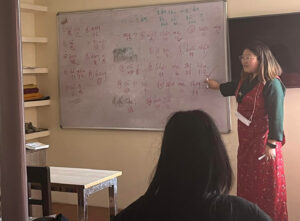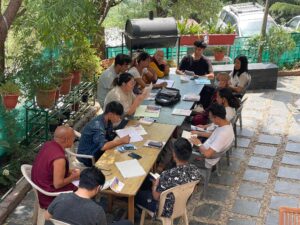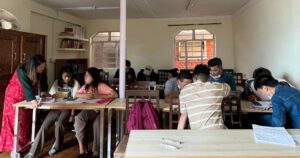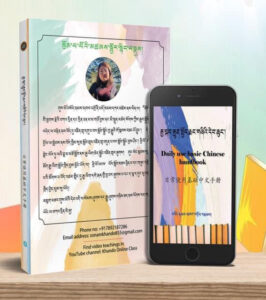 Sonam Khando is currently teaching Chinese language classes at Lha Charitable Trust where language classes such as French, English and German are also taught to adult students from Tibet and other Himalayan regions. Sonam has been teaching Chinese for over four years and is well-known among the community for her service.
Sonam Khando is currently teaching Chinese language classes at Lha Charitable Trust where language classes such as French, English and German are also taught to adult students from Tibet and other Himalayan regions. Sonam has been teaching Chinese for over four years and is well-known among the community for her service.
Contact: Can you tell us briefly about yourself? (Where were you born and from where you came, etc)
Sonam Khando: I was born and brought up in Kham Kardze where my parents are farmers, and uneducated. However, they have made sure to educate my younger sister and me by sending us to school. I studied till ninth grade in my hometown where I got the chance to learn both Tibetan and the Chinese language. Later I saw photos of other Tibetans in India and heard wonderful stories of India and the desire to go to India sparked in me like fire and I started insisting that my parents send me to India. I even warned them that if I can’t go to India, I won’t go to school either! Finally, my parents agreed to my request and I came to India in 2009 with a group by paying money to a group leader. The decision to come to India was utterly mine. Immediately after reaching Nepal, seeing the place, and finding that it was not looking similar to the place I dreamt of, I slightly regretted coming all the way. But after reaching TCV Suja (Tibetan Children’s Village) school where there are many other students like me who came from Tibet, slowly I got accustomed to the new life and in fact, I had a great time in Suja.

Khando teaching her class in Lha Charitable Trust
Photo: Lha
C: How did your journey of teaching the Chinese language start?
SK: It was all coincidence. After completing my Bachelor of Honours in Chinese from the Dalai Lama Institute for Higher Education in 2017, I came to Dharamshala to attend a teaching by His Holiness the Dalai Lama. During that time, I saw a job post by Tibet World, an NGO that also gives language classes and I got the job. I was planning to leave after a one year contract. But they requested me to stay and continue to teach. This is how I started this journey and I don’t regret it at all. I think NGOs are a great place to work as it gives one a platform to meet and engage with people from different backgrounds and different cultures. In my experience, my work gave me lots of exposure and confidence, especially in facing and connecting with more people.
C: Do you also teach one on one?
SK: Yes, apart from regular classes, I also used to teach one on one. Students who are unable to come for regular classes or some have difficulty catching up in groups, they ask me to teach separately by paying for the number of hours I teach.

Advance Chinese Language Class at Lha Charitable Trust
Photo: Lha
C: Can you share with us what inspires you to teach? What, if any, challenges do you face?
SK: One of my students returned to Tibet after completing his studies in India. I think he was a nursing student. He shared with me his experiences during his visit to Tibet about how difficult it was for him on a daily basis with not speaking or reading Chinese. It is obvious that he won’t get good jobs but he also faced a daily struggle of communication. This inspired me to help Tibetans learn basic Chinese which will be helpful for them in future, even if they don’t plan to make a career out of it, it will definitely be useful when they go back to Tibet.
Challenge….I would say that was during my first years of teaching, though I speak and know the language, I didn’t have teaching experience. So without teaching experience, I was a bit nervous and also, the students are all adult, unlike in school so it was a bit intimidating. For teaching adults, it takes patience and hard work from both the teacher and the students’ side. They need more time to understand or to learn something new. Another challenge was that my students are from different parts of the world and I don’t speak their language which became a barrier while teaching. I only speak Tibetan, Chinese and English.
C: Do you call yourself a social worker? Can you share your experience as one?
SK: I started my social work by voluntarily teaching Chinese language classes online for free. I believe that online education is accessible by all wherever you reside. I thought it was a good medium to help others. Whether I teach online or in the classroom, my aim was to help others. I uploaded many online classes on my Facebook account and I believed that even if it benefits one person, I am happy.
 C: Any tips for those learning Chinese?
C: Any tips for those learning Chinese?
SK: One tip I would like to share is, keep reading anything in Chinese or watching movies or videos in Chinese. So you won’t forget it. Since we are not using the language on a daily basis, it is easy to forget. Just keep in touch with the language.
C: You have worked with different NGOs serving the same students for years. What is the change you see from the first years of your teaching to today?
SK: For me as a teacher, over the years, I have gained more experience and I am more confident now that I can easily come to class and teach without any difficulty. I can judge the students better. As for the students, I noticed that those who come to learn on their own will study well, and there used to be students who are forced by their parents, they won’t concentrate or they won’t last.
 C: What are your future plans? Are you planning to continue working in the same field? Or study?
C: What are your future plans? Are you planning to continue working in the same field? Or study?
SK: I have published one book in the Chinese language in September 2021 aimed for beginner level students. I have printed 600 copies and distributed them at the price of 200 INR. The books were mostly distributed in major monasteries in South India like Sera, Gaden and Drepung monasteries. I have left them in bookshops in Dharamshala too and they went well despite it being my first time attempting to write a book for language students.
Now I am working on my second book – one for an elementary level in continuation of my first book. It also has content based on my personal story. Compared to my experience for the first book, I am more confident with this second book. Though there are many Chinese language textbooks, they are either written from Taiwan or China. My books are more Tibetan-based for Tibetan students, hoping they can relate to the content and learn.




 Print
Print Email
Email













